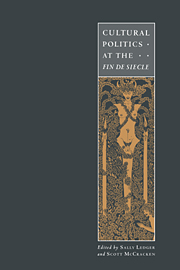Book contents
- Frontmatter
- Contents
- List of illustrations
- Notes on contributors
- Acknowledgements
- Introduction
- 1 The flight to the real
- 2 The New Woman and the crisis of Victorianism
- 3 Empire, ‘race’ and feminism at the fin de siècle: the work of George Egerton and Olive Schreiner
- 4 W. B. Yeats and Irish cultural politics in the 1890s
- 5 The double lives of man: narration and identification in late nineteenth-century representations of ec-centric masculinities
- 6 Henry James and the spectacle of loss: psychoanalytic metaphysics
- 7 ‘A very curious construction’: masculinity and the poetry of A. E. Housman and Oscar Wilde
- 8 The Pilgrims of Hope: William Morris and the dialectic of romanticism
- 9 Urban utopias: socialism, religion and the city, 1880 to 1900
- 10 Vampires and the empire: fears and fictions of the 1890s
- 11 Utopia, Limited: nationalism, empire and parody in the comic operas of Gilbert and Sullivan
- 12 Technologies of monstrosity: Bram Stoker's Dracula
- 13 Postmodernism, a Chance to reread?
- 14 Is market society the fin of history?
- Select bibliography
- Index
6 - Henry James and the spectacle of loss: psychoanalytic metaphysics
Published online by Cambridge University Press: 29 September 2009
- Frontmatter
- Contents
- List of illustrations
- Notes on contributors
- Acknowledgements
- Introduction
- 1 The flight to the real
- 2 The New Woman and the crisis of Victorianism
- 3 Empire, ‘race’ and feminism at the fin de siècle: the work of George Egerton and Olive Schreiner
- 4 W. B. Yeats and Irish cultural politics in the 1890s
- 5 The double lives of man: narration and identification in late nineteenth-century representations of ec-centric masculinities
- 6 Henry James and the spectacle of loss: psychoanalytic metaphysics
- 7 ‘A very curious construction’: masculinity and the poetry of A. E. Housman and Oscar Wilde
- 8 The Pilgrims of Hope: William Morris and the dialectic of romanticism
- 9 Urban utopias: socialism, religion and the city, 1880 to 1900
- 10 Vampires and the empire: fears and fictions of the 1890s
- 11 Utopia, Limited: nationalism, empire and parody in the comic operas of Gilbert and Sullivan
- 12 Technologies of monstrosity: Bram Stoker's Dracula
- 13 Postmodernism, a Chance to reread?
- 14 Is market society the fin of history?
- Select bibliography
- Index
Summary
Me, I exist – suspended in a realized void – suspended from my own dread …
(Georges Bataille, ‘Sacrifices’)‘Art is the apotheosis of solitude’, wrote Samuel Beckett while on the subject of Marcel Proust. In the case of Henry James the jury is still hung (up) on the question of whether his art is the apotheosis of solitude or of sociality: whether he harboured the most exquisite social sensibility ever, or the most exquisitely antisocial; whether his fictional characters learn to separate and individuate in order to become psychologically whole, hale, and hearty, or rather remain agglutinated in one vainglorious metaphorical psychomachy; and whether we are to understand James's narrative and aesthetic ‘mastery’ in terms imperial, colonial, or psychosexual. It seems to me that how we answer each of these questions, whether we think of them as primarily political, psychological, ethical or aesthetical, hinges on how we interpret the construction of ‘interiority’ in James; whether indeed we think there is such a thing as interiority, and where, if anywhere, we might locate ‘exteriority’, or whatever might represent the ‘world’ (that which is not ‘just’ language or reflexive subjectivity).
In this chapter I shall argue that one reason why it is so difficult to locate what is not ‘interior’ in Henry James is that in his fiction the topography of knowledge is, as it were, backward; or, better, it constitutes the rejection avant la lettre of interiority as Freud will define it.
- Type
- Chapter
- Information
- Cultural Politics at the Fin de Siècle , pp. 115 - 136Publisher: Cambridge University PressPrint publication year: 1995



